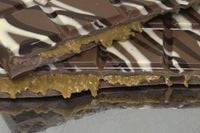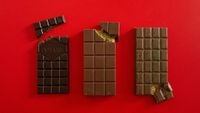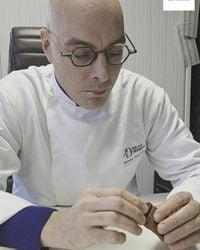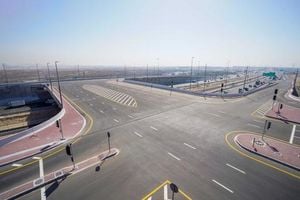In recent weeks, a new chocolate trend has taken social media by storm, captivating chocolate lovers and confectioners alike. Known as Dubai chocolate, this sweet treat features milk chocolate filled with pistachio cream and roasted angel hair, and it has become a must-try delicacy in various regions, including Morlaix and beyond.
Last week, before April 20, 2025, the editorial team at Actu Le Mans invited consumers to taste a well-known brand's version of this Dubai chocolate in Le Mans, Sarthe. The tasting was conducted by chocolatier Vianney Bellanger, who provided his expert insights on the product. Bellanger quickly noted that the chocolate tablet was surprisingly thin, contrary to the thicker texture typically associated with authentic Dubai-style chocolate. "There isn’t much pistachio!" he remarked, highlighting the lack of the key ingredient that usually defines this treat. He further elaborated that the chocolate was excessively sweet, with more pronounced notes of peanut than pistachio.
Bellanger speculated that the chocolate might have used a lower-quality roasted pistachio, explaining that genuine pistachios from Iran are quite expensive, ranging from 40 to 50 euros per kilo. He also criticized the filling, stating, "Normally, there is almost a centimeter of filling, with one-third filling and two-thirds milk chocolate," but this product fell short of that standard. Additionally, he noted that the filling was not runny as expected, which detracted from the experience. When informed of the product's price at 9.99 euros, Bellanger expressed disbelief, stating, "For me, it’s very expensive for a product like this. The price balance isn’t there." He concluded his tasting by pointing out the nutritional content, revealing that the chocolate contained 50% sugar and 36% fat, dubbing it a "calorie bomb."
The buzz surrounding Dubai chocolate isn't confined to Le Mans. In Périgueux, local chocolatiers have embraced this trend, creating their own versions of the chocolate. Artisan Florent Lafaye from Marsac-sur-l'Isle has been crafting his version of Dubai chocolate filled with pistachio cream and mixed with kadaif, a type of angel hair pastry cooked in butter. He began this venture about a month prior to April 20, 2025, and has seen such high demand that he had to order twice as many molds to keep up with production. Lafaye's tablets are priced at nearly 20 euros each, a cost attributed to the quality of raw materials and the intricate preparation involved in making them.
As the Easter holiday approached, Lafaye noted a shift in consumer preferences, with many opting for Dubai chocolate tablets over traditional Easter treats like eggs and bunnies. He remarked, "There is much more work in the fabrication. We can’t just pour it; we have to garnish it, and the raw materials are quite expensive as well." This excitement for Dubai chocolate has not only created a buzz among local customers but has also led to a resurgence in traditional pastries, blending cultural influences with modern tastes.
In Morlaix, the trend has also gained traction. Chocolatiers like Roxane Léon-Martin at Délices Chocola’Thés have been offering Dubai chocolate tablets for three weeks, with the initial deliveries selling out on the same evening they arrived. Léon-Martin noted, "For the first two deliveries, I was sold out the same evening. I have never seen anything like this." Another pastry chef, Stéphane Traon, has been producing his version of the tablet for about a month and a half. He incorporated lace crepe and fleur de sel into his recipe, creating a distinct taste that has resonated with customers. Traon has been making about 100 tablets each week, all of which are sold out consistently.
Prices for Dubai chocolate vary significantly, with smaller formats available for around 9 euros, while larger tablets can reach up to 25 euros. The allure of Dubai chocolate is not just about taste; it has become a cultural phenomenon, appealing especially to younger consumers who are willing to invest in this luxurious treat.
While many chocolatiers have jumped on the Dubai chocolate bandwagon, not everyone is on board with the trend. Frédéric Bleuzen, manager of Terres et chocolats in Morlaix, expressed skepticism about the product's appeal, calling it "marketing, not chocolate!" He criticized its overly sweet profile and noted that it did not resonate with his usual clientele.
Meanwhile, the original Dubai chocolate, created by Anglo-Egyptian entrepreneur Sarah Hamouda at her Dubai-based shop Fix, has sparked international interest. Inspired by the traditional Levantine dessert knafeh, her chocolate features a milk chocolate shell with pistachio cream, tahini, and grilled angel hair, which has led to viral success on social media. A tasting video by culinary influencer Maria Véhéra was viewed over 100 million times, propelling the chocolate into a global spotlight. Some online retailers are even selling the original tablets for over 100 euros, showcasing the high demand and prestige associated with this unique confection.
As this chocolate trend continues to grow, it’s clear that Dubai chocolate has made a significant impact on the culinary landscape, inspiring local artisans and capturing the hearts of sweet-toothed consumers everywhere. Whether it’s the traditional or the modern interpretations, this sweet sensation is here to stay, challenging chocolatiers to innovate and adapt to the evolving tastes of their customers.


![« On est systématiquement dévalisé » : star des réseaux, le chocolat Dubaï a aussi conquis Morlaix [Vidéo]](https://thumbor.evrimagaci.org/YP9wsNVGpdNft1LjHhbDYNE3oeU=/200x0/tpg%2Fsources%2Fed0fe25a-c1fd-4de0-855f-7348b18cb70d.jpeg)




